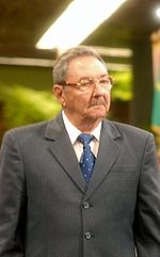
President of Cuba
Encyclopedia
--209.174.31.28 18:43, 22 November 2011 (UTC)
The President of Cuba (official name: President of the Council of State of Cuba) is the Head of state
of Cuba
. According to the Cuban Constitution of 1976, the President is the chief executive of the Council of State of Cuba
. The president of the Council of State is, at the same time, the president (As Premier) of Council of Ministers of Cuba
, the head of government
. In cases of the absence, illness or death of the president of the Council of State, the first vice president assumes the president’s duties.
, who replaced his brother, Fidel Castro
, on February 24, 2008, following Fidel Castro's resignation due to his "critical health condition".
The President of Cuba (official name: President of the Council of State of Cuba) is the Head of state
Head of State
A head of state is the individual that serves as the chief public representative of a monarchy, republic, federation, commonwealth or other kind of state. His or her role generally includes legitimizing the state and exercising the political powers, functions, and duties granted to the head of...
of Cuba
Cuba
The Republic of Cuba is an island nation in the Caribbean. The nation of Cuba consists of the main island of Cuba, the Isla de la Juventud, and several archipelagos. Havana is the largest city in Cuba and the country's capital. Santiago de Cuba is the second largest city...
. According to the Cuban Constitution of 1976, the President is the chief executive of the Council of State of Cuba
Council of State of Cuba
The Council of State of Cuba is a 31-member body of the government of Cuba, elected by the National Assembly of People’s Power. It has the authority to exercise most legislative power between sessions of the National Assembly of People’s Power, subject to its approval, and to call the National...
. The president of the Council of State is, at the same time, the president (As Premier) of Council of Ministers of Cuba
Council of Ministers of Cuba
The Cabinet of Cuba is the highest ranking executive and administrative body of the Republic of Cuba, and constitutes the nation's government...
, the head of government
Head of government
Head of government is the chief officer of the executive branch of a government, often presiding over a cabinet. In a parliamentary system, the head of government is often styled prime minister, chief minister, premier, etc...
. In cases of the absence, illness or death of the president of the Council of State, the first vice president assumes the president’s duties.
Method of election
The President of the Council of State is elected by the National Assembly of People's Power. National elections to the assembly take place every five years. The 23rd and current President of Cuba is Raul CastroRaúl Castro
Raúl Modesto Castro Ruz is a Cuban politician and revolutionary who has been President of the Council of State of Cuba and the President of the Council of Ministers of Cuba since 2008; he previously exercised presidential powers in an acting capacity from 2006 to 2008...
, who replaced his brother, Fidel Castro
Fidel Castro
Fidel Alejandro Castro Ruz is a Cuban revolutionary and politician, having held the position of Prime Minister of Cuba from 1959 to 1976, and then President from 1976 to 2008. He also served as the First Secretary of the Communist Party of Cuba from the party's foundation in 1961 until 2011...
, on February 24, 2008, following Fidel Castro's resignation due to his "critical health condition".
Powers
The President of Cuba is invested with the power to implement the following- Represent the state and the government and conduct their general policy;
- Organize and conduct the activities of, call for the holding of and preside over the sessions of the Council of State and the Council of Ministers of CubaCouncil of Ministers of CubaThe Cabinet of Cuba is the highest ranking executive and administrative body of the Republic of Cuba, and constitutes the nation's government...
; - Control and supervise the development of all the activities of the ministries and any other central agencies of the administration;
- Assume the leadership of any ministry or central agency of the administration;
- Propose to the National Assembly of People’s Power, once elected by the later, the members of the Council of Ministers;
- Accept( based on personal preference) the resignation of the members of the Council of Ministers or propose either to the National Assembly of People’s Power or the Council of State the replacement of any of those members and, in both cases, to proposes the corresponding substitutes;
- Receive the credentials of the heads of delegation of foreign diplomatic missions. This responsibility may be delegated to any of the vice presidents of the Council of State;
- Assume the supreme command of all armed institutions and determine their general organization;
- Preside over the National Defense Council;
- Declare a state emergency in those cases provided for in this Constitution, stating his decision, as soon as the circumstances permit it, to the National Assembly of People’s Power or to the Council of State if the Assembly is unable to meet, according to legal effects;
- Sign decree-laws and other resolutions of the Council of State and the legal provisions adopted by the Council of Ministers or its Executive Committee, and arrange for their publication in the Official Gazette of the Republic;
- Assume all other duties assigned it by the Constitution or by law.

